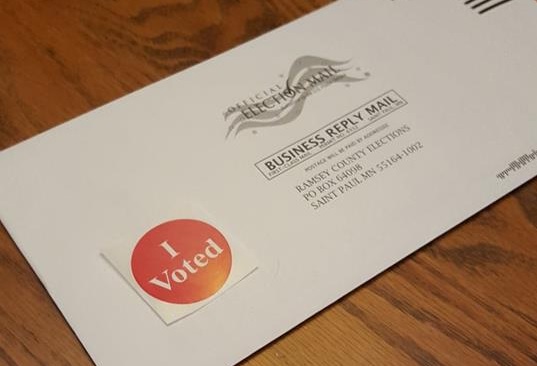
Matt Doll, Minnesota Environmental Partnership
On Tuesday, Vice President Kamala Harris and former President Donald Trump took part in their first (and likely only) debate of their closely-contested election race. Squaring off in Philadelphia, speaking in person to two ABC moderators and via television to more than 67 million viewers, the two candidates offered starkly contrasting visions for the future.
The very last question they answered was: “what would you do to fight climate change?” Each candidate’s answer was about the same length: 232 words from Harris, and 233 from Trump.
As a non-profit organization, MEP doesn’t endorse candidates or weigh in on individual campaigns. But we can say this much: the American people deserve to hear more about how their candidates would tackle environmental issues, including on the debate stage.
Climate change is an existential threat to our nation and world. Minnesotans are bearing witness to its early stages: December tornadoes, April heat waves, drought, then flooding, rainy winters, and summer days choked by wildfire smoke. Meanwhile, our waters become increasingly impaired, and many Minnesotans don’t have clean drinking water in their homes.
Environmental issues should not be siloed from other topics on voters’ minds – they impact all the other issues that we care about.
The first question put to the candidates involved the economy, broadly including jobs, prices, and international trade. Climate change is poised to disrupt all aspects of the global economy, and is already beginning to do so. Agricultural products from grain to coffee will become much more expensive due to extreme drought or floods. Severe storms and drought impacts on ports and canals are starting to impact global trade, introducing risk and instability with severe economic costs.
Housing, of which we already have a shortage, will not be spared impacts, either. Americans in high-risk areas like Florida are having difficulty affording insurance. When their homes are wiped out by storms or wildfire, they’ll be displaced, and our current housing stock may not be equipped to support them.
Our healthcare system, another topic of the debate, will be increasingly strained responding to climate impacts on human health, which led the American Medical Association to declare climate change a public health crisis in 2022. Hospitals are already facing new challenges from pollutants like microplastics and PFAS that are linked to rising rates of cancer. People of color and low-income families are disproportionately affected by these health threats.
One of the most contentious topics of the debate was immigration and border security, an issue that goes hand in hand with climate change. Countries of the global south with fewer resources to deal with extreme heat and drought are already becoming sources of climate refugees seeking safety elsewhere, including in the United States. Tens of millions more are expected to become climate refugees within the next decade or so. Regardless of one’s position on immigration in general, it’s clear that allowing the climate crisis to get worse will make managing migration more challenging.
Even crime, another heated debate topic, is linked to increased temperatures. While crime has been falling in the United States for decades, research shows that spikes in outside temperature correlate with spikes in violent crime. The continued prevalence of lead in drinking water and in homes in many communities is also considered a major risk factor for criminal behavior.
Debates are a difficult format for addressing these complex issues. But it’s not a stretch to suggest that the news media have been uninterested in exploring the links between climate change, environmental health, and the top policy debates Americans care about. Above all, we know that Americans care about their children, about future generations. It’s the number one reason that they support reducing climate change.
It’s also key to remember that climate change and environmental destruction is a crisis of choice. We can choose to quickly transition our economy away from fossil fuels in favor of increasingly affordable clean energy – a transition already accelerated by the Inflation Reduction Act. We can choose to focus agriculture on feeding ourselves with less cost to people and planet. We can choose to phase out pollutants that make us sick. We can choose to restore our natural spaces. We can choose to protect the communities on the front lines of these intersecting crises.
We hope that all candidates elected this November will make the right choices for our people and planet.